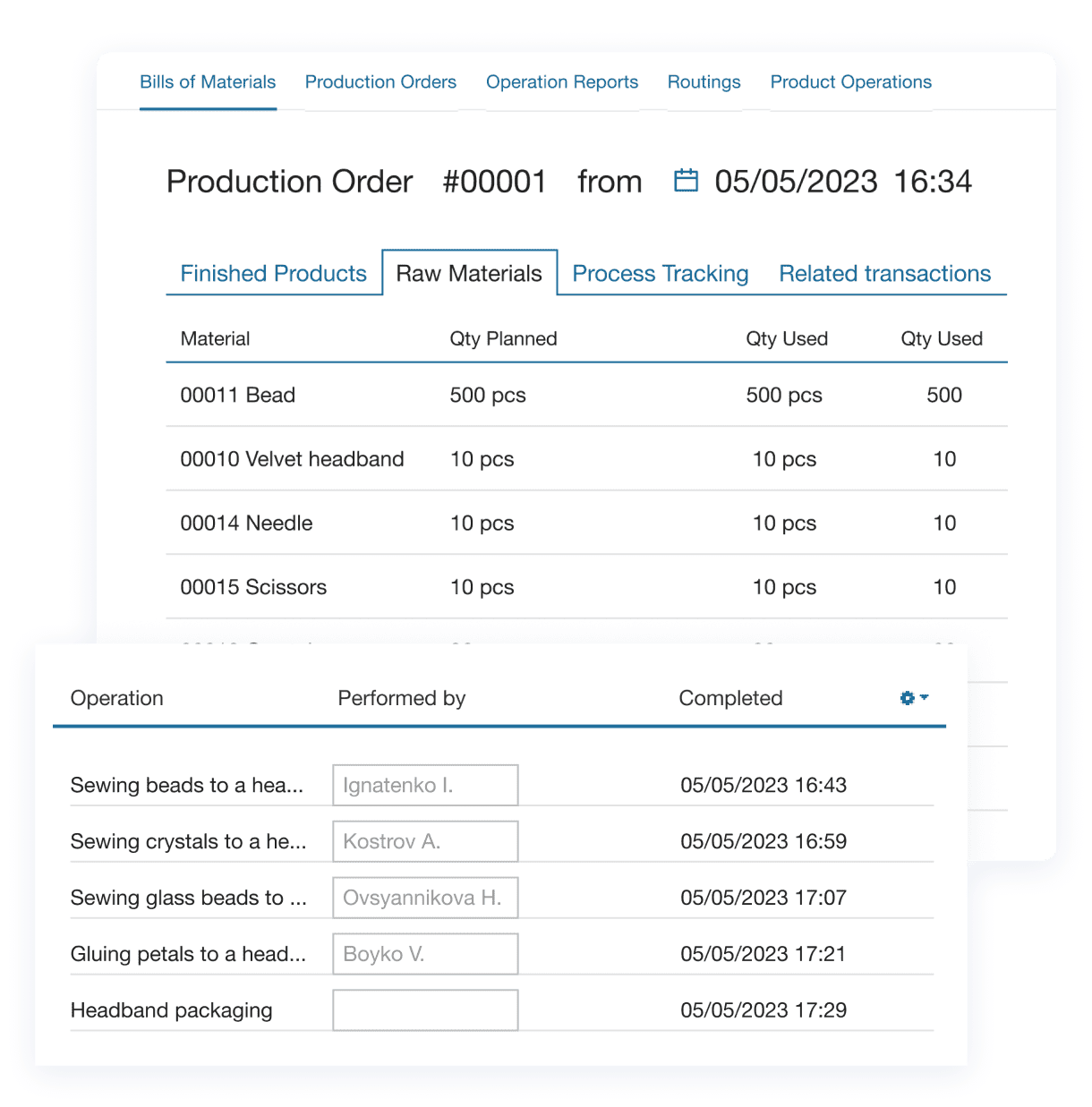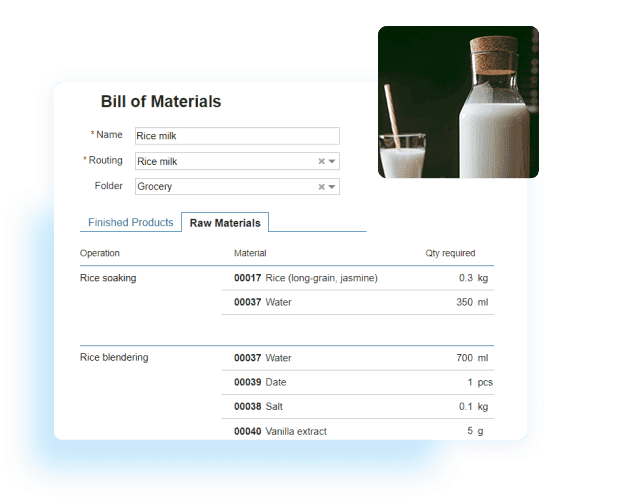India’s manufacturing sector is evolving rapidly, shifting from an import-dependent economy to a global production hub. According to Mordor Intelligence, the industry is projected to reach $338.5 billion by 2025, growing at a 9.11% CAGR, and potentially hitting $532.56 billion by 2030.
This growth is fueled by digitization, automation, and improved production quality, making India an attractive destination for global investors and creating new business opportunities. The focus on local manufacturing over outsourcing has further strengthened the sector, driving demand for high-quality products and advanced technology.
With these advancements, India is set to become a powerhouse in global manufacturing, offering entrepreneurs and SMEs lucrative opportunities to enter the industry. If you are looking for the best manufacturing business to start in India, this guide will help you understand the trending manufacturing businesses, their market trends, and support from the government.
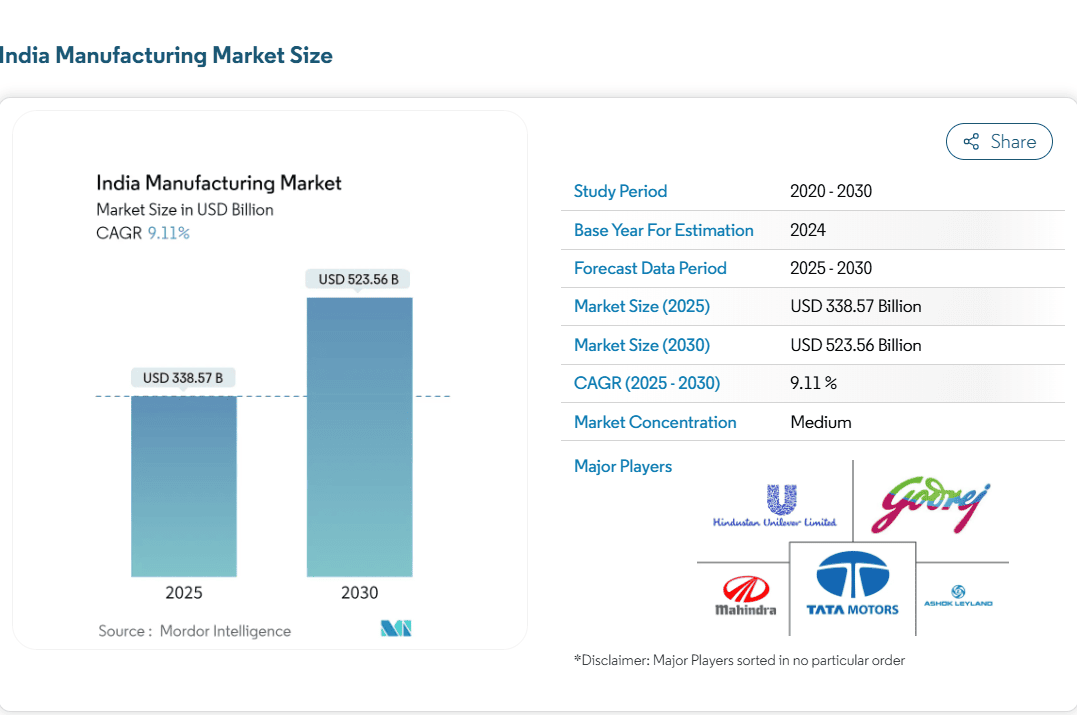
- Why Start a Manufacturing Business in India?
- Factors to Consider Before Starting a Manufacturing Business
- Manufacturing Opportunities in India: Key Insights for Entrepreneurs
- Best Manufacturing Regions in India
- Government Schemes to Support Manufacturing Businesses
- Best Manufacturing Business Ideas in India 2026
- Unique and Innovative Manufacturing Ideas
- Tips to Succeed in the Manufacturing Business
- Summing Up
- FAQs on Manufacturing Business Ideas in India 2026
- List of Resources
Why Start a Manufacturing Business in India?
India offers a favorable environment for manufacturing entrepreneurs. The cost of labor remains relatively low, allowing businesses to maintain competitive pricing while scaling operations. Access to diverse raw materials — from agricultural produce to industrial metals — makes sourcing more efficient. Additionally, government initiatives like Make in India and PLI (Production Linked Incentive) schemes encourage domestic manufacturing through subsidies, tax benefits, and simplified compliance. Whether you’re based in a metro city or a rural area, the manufacturing sector presents opportunities to build a sustainable business with long-term growth potential.
Factors to Consider Before Starting a Manufacturing Business
Before launching your manufacturing venture, consider the following key factors:
- Capital Investment: Account for expenses related to machinery, facility setup, labor, and working capital.
- Licensing & Regulations: Research the licenses required for your product category — from GST registration to factory or safety permits.
- Market Demand and Competition: Study current trends, analyze competitors, and assess long-term demand to validate your product idea.
- Location and Logistics: Choose a location that offers access to suppliers, transport facilities, and skilled labor while minimizing distribution costs.
Manufacturing Opportunities in India: Key Insights for Entrepreneurs
Start by evaluating the financial aspects — understand your initial investment and potential revenue based on industry statistics.
| Business Unit | Initial Investment | Profit Margin | Annual Revenue Potential |
Incense Sticks |
₹5–10 Lakhs |
25–40% |
|
Jewelry |
₹10–25 Lakhs |
30–50% |
|
Handicraft |
₹3–15 Lakhs |
20–35% |
₹20–50 Lakhs |
Textile |
₹10–20 Lakhs |
25–45% |
₹1–3 Crore |
Organic/Agro Base |
₹10–30 Lakhs |
35–55% |
|
Biodegradable Bags |
₹10–20 Lakhs |
20–40% |
|
Herbal & Ayurvedic |
₹15–30 Lakhs |
30–50% |
₹80 Lakhs – 2.5 Crore |
Food Processing |
₹20–60 Lakhs |
25–50% |
|
Kitchen Utensils |
₹10–30 Lakhs |
25–40% |
|
Block & Concrete |
₹30–80 Lakhs |
20–35% |
₹1.5–6 crores |
Best Manufacturing Regions in India
Now, let’s explore the ideal locations for setting up your production facilities based on regional advantages.
| Regions | Key Manufacturing Sectors | Why It Thrives |
North |
Jewelry, Incense Sticks, Handicrafts |
Rich cultural heritage, skilled artisans, and easy access to raw materials |
West |
Textiles, Concrete Blocks, Food Processing |
Strong industrial base, export proximity, and large consumer market |
South |
Textiles, Incense, Kitchen Utensils |
Skilled labour, advanced manufacturing facilities, and high domestic demand |
East |
Handicrafts, Organic Farming, Herbal Products |
Abundant natural resources, fertile soil, and growing demand for herbal goods |
Central |
Food Processing, Concrete Blocks |
Rapid infrastructure growth and diverse raw material availability |
Government Schemes to Support Manufacturing Businesses
Another key factor to consider is the government support available for startups in the manufacturing sector. Let’s explore the schemes that can help you get started.
| Government Schemes | Industry Focus | Benefits |
Electronics, Textiles, Food Processing |
Tax rebates and financial incentives |
|
Entire Manufacturing Industry |
Simplified regulations |
|
Small and Medium Enterprises (SMEs) |
Low-interest loans |
|
Herbal and Ayurvedic Sectors |
Marketing support and funding for market research |
|
Textile and Clothing Manufacturing |
Infrastructure support and export benefits |
|
Handicraft and Artisan Sector |
Training, financial aid, and market exposure |
|
Construction and Infrastructure |
Access to government tenders and policy support |
|
Agro-Based and Organic Industries |
Certification assistance and market connections |
|
Organic Food Sector |
Global promotion and certification support |
|
Food Processing Industry |
Grants for growth and modernization |
Best Manufacturing Business Ideas in India 2026
Let us now discuss in detail the 10 most trending manufacturing business ideas in India for 2026.
1. Agarbatti — Incense Sticks
Incense sticks are known as agarbatti in India. An incense stick usually contains the extracts of the Commiphora wightii tree, sandalwood herbs, etc. Indians, deeply rooted in their culture and traditions, use this product. It is believed to purify air and bring positive energy to the environment.
In India, almost every household uses agarbatti for all religious occasions. As a result, it is also immensely gaining popularity in temples, churches, mosques, and monasteries. The demand for agarbattis is consistent, making it a strong option for low-investment manufacturing businesses with steady demand.
For example, Lakshmi Trading Services launched their agarbatti business in 2018 with an investment of ₹8 lakhs. By 2023, thanks to strategic investments in production, efficiency, and branding, they grew their revenue to ₹45 lakhs annually with a 28% profit margin. They capitalized on local market advantages, such as low production costs and proximity to religious hubs, to build a profitable enterprise.
In almost all the parts of India, everyone is running in manufacturing the Agarbatti, but until now no one is able to surpass this market from the region of Karnataka and Tamil Nadu. These two states are considered to be the highest exporters in India. They have access to raw materials, such as the best-quality bamboo sticks, perfumes, and essential oils.
According to Markets & Data, incense sticks were worth $1,234.5 million for the year 2024, and it is expected to grow up to $1,950.59 million by 2032. What is driving this growth? It is because in India they are part of everyday life.
2. Crafting Jewelry
In India, jewelry manufacturing is one of the ancient businesses. It started long before traditional gold and diamonds, as well. There is a lot of handcrafted jewelry nowadays. If you’re creative, starting a business in this field is a fantastic idea. You just need to be more creative. Similarly, social media platforms like Instagram and Facebook will allow your small businesses to directly connect globally with their customers.
Jaipur, Kolkata, Delhi, Bangalore, and Mumbai are the biggest markets for jewelry. So, it is better that you take wise decisions and start online rather than fail by competing in large markets.
India’s jewelry manufacturing has taken a big leap: everyone is shifting to e-commerce and online payments. TechSci Research estimates that the e-commerce sector expanded by 12% in 2024.
So, for those small entrepreneurs who were running their business with traditional methods with no fixed rate, they are facing challenges, but now all the retail chains serving online are ruled with fixed rates and certifications. It is making it easier for the customers to be clear while buying jewelry with a real pricing rate and transparency. Hence, now it is easy, safe, and convenient to buy jewelry.

3. Handicraft Manufacturing
The rich Indian cultural heritage in handicrafts is always in demand, and now, with the rise in sustainability, it has made this industry very promising for the small business entrepreneurs. There are so many people nowadays in general who like to focus more on sustainable lifestyles. Similarly, now those artists who used to craft wood furniture, home decor, and textile-based crafts are emerging in the digital market, and it is helping them to leverage their business on a global scale.
For handicraft entrepreneurs, now is the time to expand to India. This market is mainly for small businesses. You can thrive in your traditional business on a global scale. It will not require a large sum of money to invest. In short, it will be quality over quantity.
Statista report values the national economy’s exports at $1,707,484.87 in 2024. This industry plays a giant role in improving the employment rate not only for businesses but also for skilled individuals, especially those living in rural areas.
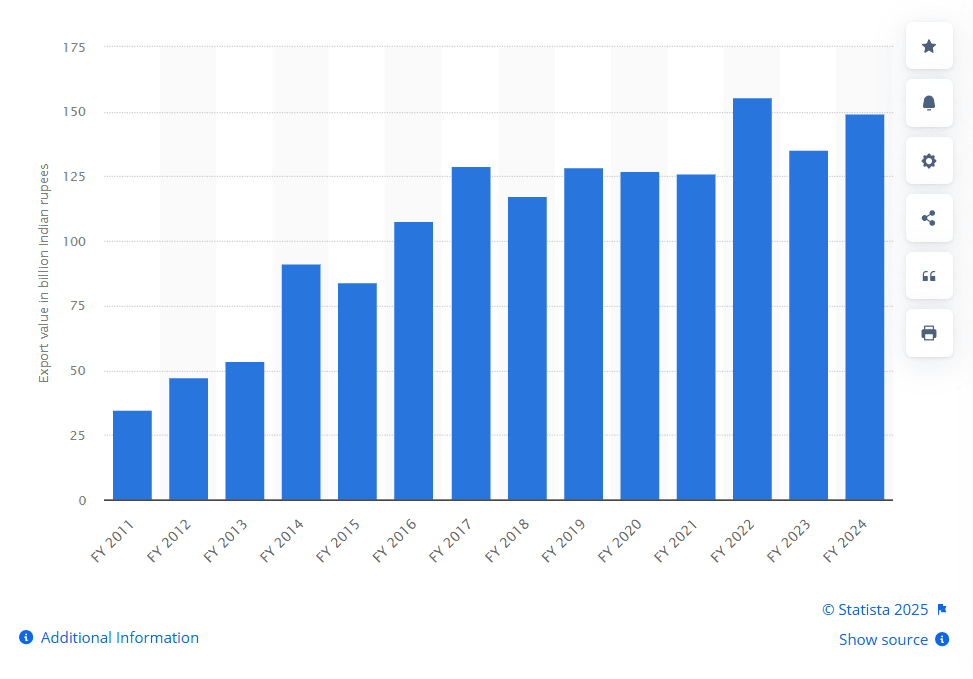
4. Textile Manufacturing
Another key pillar of India’s boosting economy is the textile manufacturing industry. It is helping millions of people in getting employment and many opportunities for start-ups. The surge of demand in fabrics like cotton, linen, plant-dyed fiber, bamboo, kashmiri shawls, etc., is getting global attention.
When you start a textile business, the first step is to understand the raw materials, suppliers, sewers, and, most importantly, the skilled laborers. You have to always keep in mind that this business has a lot of competition. For you to start this business, you should consider manufacturing only one fabric at a time so that you understand the market and don’t face loss by taking into account many fabrics.
The Mega Integrated Textile Region and Apparel (PM Mitra) park scheme made a massive change for the textile industries. It has planned seven mega textile parks across the country with an investment of ₹4,445 crore. The primary objective is to establish more manufacturing units. The primary objective is to reduce costs and attract a global market. These parks will provide top infrastructure and improve production.
Neytt, a carpet manufacturer, creates and sells high-fashion carpets, rugs, table runners, and wall art to B2C customers in India and abroad. To stand out, they leverage their expertise in producing large-size machine-made rugs — something most competitors struggle to replicate.

5. Organic Farming and Agro-Based Manufacturing
In this materialistic world, many people are getting busier and busier with their work for making money. Many people are having trouble keeping up a healthy lifestyle during this time. But after organic and agricultural farming has come into the picture, so many consumers are becoming health conscious so that they can balance their lifestyle.
The growth in this sector is booming like anything, and it’s capitalizing so much. Their demand is rising in pulses, spices, wild honey, herbals, etc., and they are increasing day by day. The leading states in this industry are Kerala, Himachal, and Uttarakhand because of the weather conditions.
Small entrepreneurs living in small towns can efficiently run this business if they prefer not to explore metro cities. Especially if your place is a cold region, it will grow drastically, and with varieties of vegetables, you can boost your business by staying home without moving out of your hometown.
According to the Agricultural and Processed Food Products Export Development Authority (APEDA), 66% of consumers check for organic authenticity on packaging, making organic food production a strong market trend. In FY 2023, India’s organic market was valued at ₹16,800 crore (~$2 billion).
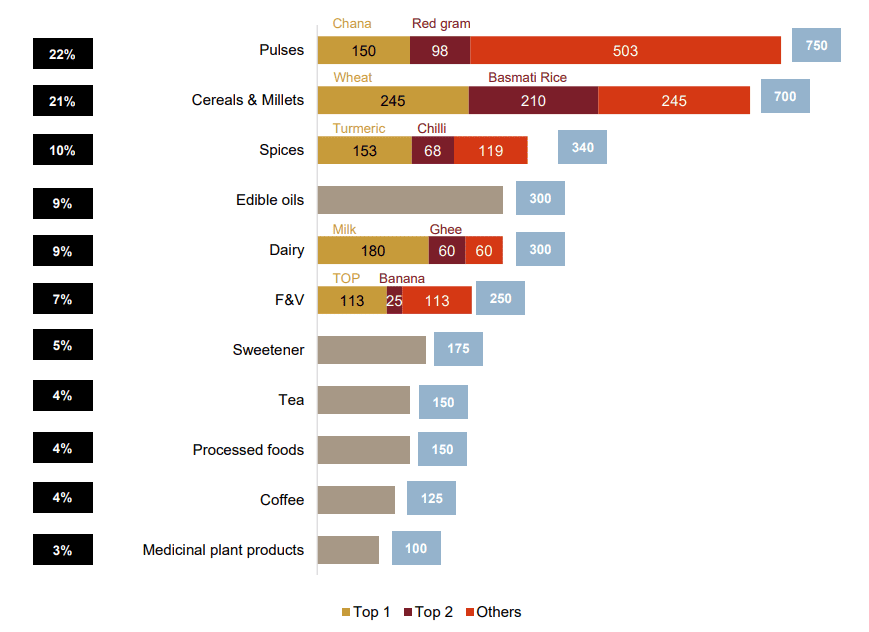
Unicorn Natural Products manufactures herb extracts, essential oils, seasonings, and spices, sourcing organic raw materials from NGOs, farmers, and local tribes across India. Their B2B customers include companies in the pharmaceutical and Ayurvedic industries that use natural plant ingredients in their products. The company supplies spices, oils, and extracts in bulk, with order sizes typically ranging from 1 to 20 tons for manufacturing or retail packaging.
6. Biodegradable Carry Bags Manufacturing
The country experienced a sharp increase in pollution. So, the government made strict regulations on using plastic. The market witnesses a sharp rise in biodegradable bags. This initiative helps small manufacturers to meet the demands by selling their biodegradable bags in supermarkets, D-marts, and e-commerce companies looking for eco-friendly packaging.
For those wanting to start this business, this is a good start; it’s booming. Due to India’s nearly complete ban on plastic use, you can now operate this business from anywhere in the country. So, all the people want these biodegradable bags in their household, shops, offices, etc.
The report by MarketsandMarkets predicts a 21.3% compound annual growth rate (CAGR) in the global biodegradable market from 2024 to 2029. It shows the shift towards more eco-friendly materials to use in the future and reduce the waste of pollution to decrease pollution.
7. Herbal and Ayurvedic Manufacturing
India is one of the major suppliers in the world for herbal and Ayurvedic goods. The global shift toward wellness products has helped India be on top. From buying health supplements to skin care, small businesses are flourishing in this industry.
If you are one among those wanting to start this business, now is the right time for you without much investment in cost and less charge of labor. The only thing is that you should be someone who knows about the medicinal plants and their benefits. If you have this basic knowledge, it will be easier to gain profit in this business.
Some states, such as Kerala and Uttarakhand, are leading in this business. They have already established and are well-known for their several herbal and Ayurvedic brands.
The Indian government has approved significant funding for these states to foster further growth and economic development. In addition to India, this sector now exports to Europe and North America. According to a press release by the Government of India, the Ministry of Ayush launched the Central Sector Scheme for Promotion of International Cooperation in AYUSH. It is basically designed to boost exports globally and gain recognition for Ayurvedic yoga, Unani, Siddha, and homeopathy. This scheme is made to make India a global leader in medicine and wellness.
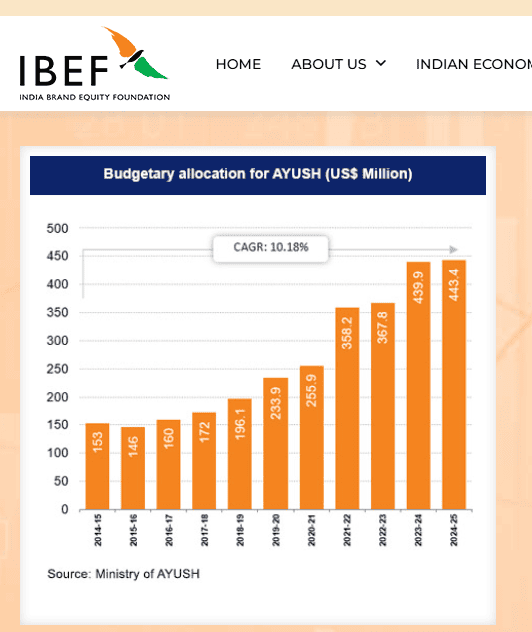
Cura Pharmaceuticals, a manufacturer of Ayurvedic and Unani products, offers a diverse range of 500+ items, including medicines (capsules, pills, and syrups), juices, oils, and vinegar. Focused on holistic well-being, Cura caters to health-conscious consumers while investing in research and development to stay ahead of industry trends.
8. Food Processing Manufacturing
India is experiencing a rapid growth in food processing manufacturing, driven by a changing lifestyle that favors more convenience foods. In metro cities, life is so busy that it is becoming difficult for the consumers to cook food in time. They are unable to balance it. This way, processed foods are gaining a lot of traction because they are ready-made and save time.
It is benefitting many small manufacturing businesses, and even for startups, you can expand your business by leveraging small costs. One of the leading manufacturers in food processing was Maharashtra until now, but presently, with the growing demand everywhere, it is increasing day by day.
You can conduct this business from the comfort of your home, which is particularly advantageous for homemakers. They can devote their time to the household as well as take out time for this, which will bring a lot of profit and more employment to every household.
Artisanté, a craft chocolate and coffee manufacturer, launched just before the global pandemic. Despite the challenges, the company not only survived but thrived through strategic promotions, including PR, digital marketing, and influencer collaborations. Today, Artisanté serves B2C customers across India and internationally, along with a growing base of B2B clients.

9. Kitchen Utensils Manufacturing
The business of manufacturing kitchen utensils is growing rapidly in India. The steel utensil category is experiencing the fastest growth in the market. It is because half of India’s population is middle class and lower middle class. They want to purchase more of affordable and good, sturdy quality.
Exploring new varieties such as ceramic and non-toxic kitchenware further boosts the economy. Small manufacturing businesses in Tamil Nadu and Gujarat are leading this business due to their quality and price.
In this sector, the price should be very minimal to maximize your sales. Nowadays, consumers are focusing on toxin-free and durability. There is a lot of growth if you have a small business in this sector because the target audience is huge, and it is easy to profit both domestically and internationally as well.
According to Mordor Intelligence, the market demand is growing in cookware. It includes all types of kitchenware, like pots, pans, pressure cookers, etc., made from steel, aluminum, and glass. You can see in the graph below the high growth rate in the market.
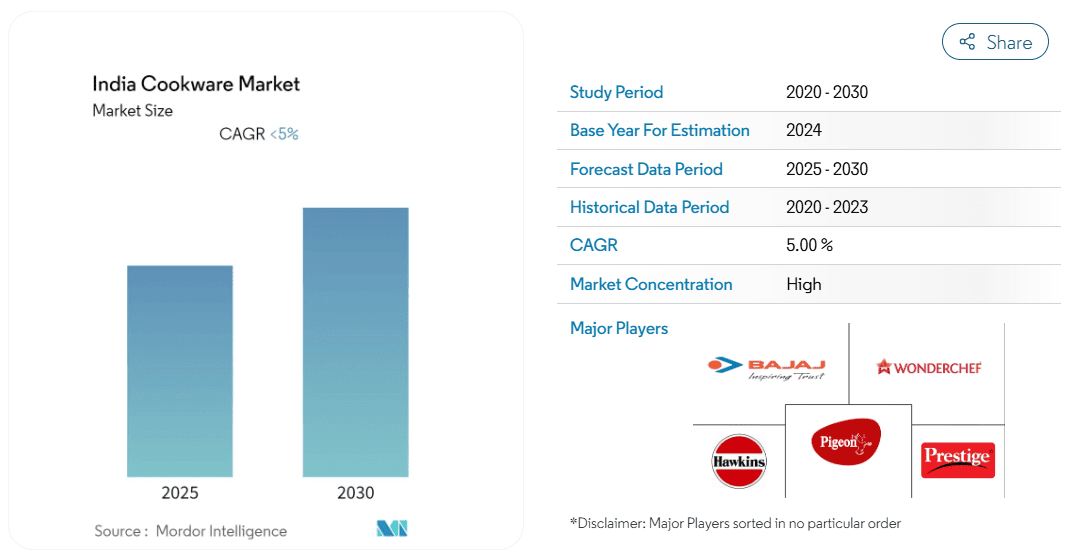
10. Block and Concrete Manufacturing
In India, building a house traditionally involves using bricks, but with the increasing pollution and harsh weather conditions, this is no longer the case. People are moving away from bricks and switching to concrete due to its benefits, such as:
- Thermal insulation, which will give your house cooling resistance in the summer.
- It can also provide fire protection to you
- It has low maintenance and is sturdy.
- It is way more cost-effective than the traditional bricks.
This block is not only for construction, but you can also use it for flooring, paving stones, walls, etc. This block has brought more focus on sustainable solutions for people.
This business is booming in major cities like Maharashtra, Karnataka, and Uttar Pradesh. But now, with the increase in demand, the shift is also greater in the northeastern part of India. The northeastern population is increasing, and more tourists are coming. They have now started using more blocks. This has led to an increase in business there.
If competing in major cities is challenging for small businesses, they can focus on the northeast part of India. The manufacturers are still very few, but consumers are still purchasing it. It is a giant chance to grow your business if you shift your focus from the major cities.
According to TechSci Research, these concrete blocks are gaining significant growth in the market. It was valued $3.62 billion in 2024 and is expected to grow $6.16 billion by 2030.
Here are 10+ extra small scale manufacturing business ideas you might find helpful.
11. Organic Personal Care Products
Manufacturing herbal shampoos, body scrubs, and natural deodorants appeals to a health-conscious audience. With increasing awareness about chemical-free alternatives, this sector is set for growth. Good formulations and packaging help build brand value.
12. Solar Panel and Equipment Manufacturing
India’s renewable energy focus makes solar equipment manufacturing a long-term opportunity. Businesses can produce solar panels, batteries, or accessories like inverters. Government incentives and rising adoption across industries drive growth.
13. Disposable Medical Supplies
Masks, gloves, and syringes are in continuous demand, especially post-pandemic. Manufacturing these supplies requires regulatory approvals but has high-volume sales potential. Hospitals, clinics, and distributors form a solid customer base.
14. Paper Stationery Products
Products like notebooks, ledgers, diaries, and answer sheets are still essential for students and offices. Setting up a paper product unit is relatively simple and scalable. Custom printing options can further increase market appeal.
15. Fitness Equipment Manufacturing
As fitness awareness rises, so does the demand for resistance bands, dumbbells, yoga mats, and benches. Manufacturing simple gym gear can be a low-entry barrier business with strong urban demand. Partnering with gyms and influencers helps build trust.
16. LED Lighting Products
LED lights are energy-efficient and replace traditional lighting across homes and industries. Manufacturing LED bulbs, panels, and fittings offers various B2B unique manufacturing business ideas and possibilities. It requires precision components but delivers good margins.
17. Toy Manufacturing
India is aiming to become a global toy hub, reducing dependency on imports. Manufacturing safe, educational toys for various age groups has huge domestic potential. Local production, quality assurance, and creativity are key drivers.
18. Smart Home Devices
Home automation is gaining traction in urban India. You can manufacture affordable smart switches, door locks, or sensor lights. With the right tech partners, this business can serve both the domestic market and exports.
19. Pet Food and Accessories Manufacturing
India’s pet care market is growing fast, especially in metro cities. Manufacturing dog food, toys, or grooming items taps into a high-margin, emotional consumer segment. Proper product formulation and branding are important.
20. Mobile Accessories Manufacturing
With the growing smartphone market, there’s rising demand for cases, chargers, cables, and screen protectors. A small to mid-scale unit can serve both retail and wholesale markets. The key lies in product quality, trend alignment, and fast production cycles.
21. 3D Printing and Prototyping Services
Industries like automotive, healthcare, and design are increasingly using 3D printing for rapid prototyping. A 3D printing business offers services from modeling to finished prototypes. Moderate investment and the ability to serve custom, niche markets make this idea attractive.
22. Detergent and Cleaning Products
Manufacturing household cleaning products like detergents, phenyl, and dishwashing liquids can be started on a small scale. The products have daily use and steady demand. Competitive pricing and strong distribution are key.
23. Furniture Manufacturing
Rising real estate development and consumer preferences for stylish home décor are driving furniture demand. Starting a furniture unit that manufactures modular furniture, office desks, or home furnishings can cater to local and export markets. Design and build quality are key success factors.
24. Automobile Parts Manufacturing
India is one of the largest automotive markets. Establishing a unit to produce auto components like filters, bolts, or plastic parts is a viable B2B opportunity. Tying up with OEMs and maintaining consistent quality are essential for growth.
Unique and Innovative Manufacturing Ideas
If you’re looking for fresh opportunities, consider these innovative directions:
- AI-Integrated Machinery: Develop or assemble smart machines that optimize industrial processes and enable automation for factories.
- Next-Gen Construction Materials: Manufacture products like modular panels, aerated concrete blocks, or synthetic stone alternatives.
- Smart Tableware and Kitchenware: Explore manufacturing of custom food containers, multi-functional utensils, or kitchen tools with tech enhancements.
Tips to Succeed in the Manufacturing Business
To build and grow a sustainable manufacturing business, keep these tips in mind:
- Conduct Market Research: Understand your target market’s needs, preferences, and pricing expectations.
- Start Small and Scale Gradually: Begin with a focused product range and expand as your brand and demand grow.
- Prioritize Quality and Service: High-quality products and responsive customer support foster loyalty and repeat sales.
- Adopt Technology Early: Use inventory management tools, production tracking software, or ERP systems to optimize operations and reduce inefficiencies.
From Raw Materials to Final Product — Sorted
Kladana helps new manufacturers stay on top of orders, stock, and production — without the spreadsheet chaos.
Summing Up
The manufacturing sector in India is growing rapidly. With technological advancement and shifting consumer preferences, the market is full of competition.
The competition doesn’t stop after all; the main challenges start when you have to manage your production house, supply chains, inventory, etc. Many of the small businesses fail even after following all the steps because they handle everything manually and find it difficult to manage it.
FAQs on Manufacturing Business Ideas in India 2026
India’s manufacturing industry is expanding rapidly, driven by technological advancements and government initiatives. If you’re considering entering this sector, these frequently asked questions can provide insights before you start.
Which Manufacturing Businesses Are Currently Trending in India?
Key sectors include textiles, organic farming, food processing, incense sticks, herbal products, and Ayurveda-based manufacturing.
How much capital is required for a small-scale factory?
Small and medium enterprises (SMEs) may require ₹5–10 lakh, while larger ventures may need ₹50 lakh to ₹1 crore.
Are there Any Government Support Schemes Available?
Yes, schemes like MSME loans, Make in India, and the Production-Linked Incentive (PLI) scheme support manufacturing businesses.
What Are the Biggest Challenges in the Manufacturing Industry?
Key challenges include high operational costs, supply chain complexities, and regulatory approvals.
Which Are the Best Regions in India for a Manufacturing Business?
Gujarat, Maharashtra, Tamil Nadu, and Karnataka offer strong infrastructure, skilled labor, and access to raw materials, making them ideal for manufacturing.
Which manufacturing business is most profitable in India?
Profitability depends on demand, investment, and operational efficiency. However, sectors like food processing, pharmaceuticals, garments, and packaging tend to be among the most profitable due to steady market demand and scalability. Choosing a niche with low competition and high local demand can further increase margins.
Can I start a manufacturing business from home?
Yes, many small-scale manufacturing businesses can be started from home. Examples include homemade snacks, candles, soaps, or handcrafted items. You’ll need to ensure your setup complies with local zoning laws and safety standards. Registering your business and maintaining basic documentation is also recommended.
What licenses are needed for manufacturing in India?
The required licenses vary by product type and scale but generally include business registration (e.g., Udyam/MSME), GST registration, factory license (for medium/large units), and pollution control board clearance. Food, pharma, or cosmetic manufacturing may also require FSSAI, CDSCO, or AYUSH approvals. It’s best to consult your local authority or a compliance expert to ensure you meet all legal requirements.
List of Resources
- Mordor Intelligence: India Manufacturing Market Size & Share Analysis — Growth Trends & Forecasts (2025 — 2030)
- Markets and Data: India Incense Sticks Market
- TechSci Research: India Gems and Jewelry Market
- Statista Report: Value of Handicrafts Exported from Indian between Financial Year 2011 to 2024
- MarketsandMarkets: Biodegradable Plastic Market
- IBEF: Ayush Industry India
- Mordor Intelligence: Kitchenware Market in India Size & Share Analysis — Growth Trends & Forecasts (2025 — 2030)
- TechSci Research: India Autoclaved Aerated Concrete Blocks Market
- APEDA Report: Study of Indian Organic Market and Export Promotion Strategy
- Extension Journal: Business Appraisal of Incense Sticks. A Case Study of Lakshmi Trading and Services
- Industrial Extension Bureau: Establishment of Facility for Manufacturing of Artificial Jewellery
- Government of India: Economic Survey 2024–2025
- Institute of Industrial Development: Project Report of Biodegradable Plastic Bags
- The Ministry of Food Processing Industries: Pradhan Mantri Formalisation of Micro Food Processing Enterprises (PMFMPE) scheme
- The Ministry of Micro, Small & Medium Enterprises: Schemes for SMEs 2024
- The Ministry of New and Renewable Energy: Production Linked Incentive (PLI) Scheme: National Programme on High Efficiency Solar PV Modules
- PM India: Make In India
- The Ministry of Ayush: Official Website
- The Ministry of Textiles: Textile Park Scheme
- The Ministry of Textiles: Handicraft Development Programme
- The Ministry of Housing and Urban Affairs: Smart Cities Mission
- The Ministry of Agriculture & Farmers Welfare: Paramparagat Krishi Vikas Yojana (PKVY)
- The Ministry of Commerce and Industry: National Programme for Organic Production (NPOP)
- The Ministry of Food Processing Industries: Food Processing Fund
- ELE Times: The 3D Printing Industry in India: Growth, Opportunities, and Challenges
- Statista: Smart Home — India
- Markets and Data: India Pet Market Assessment
